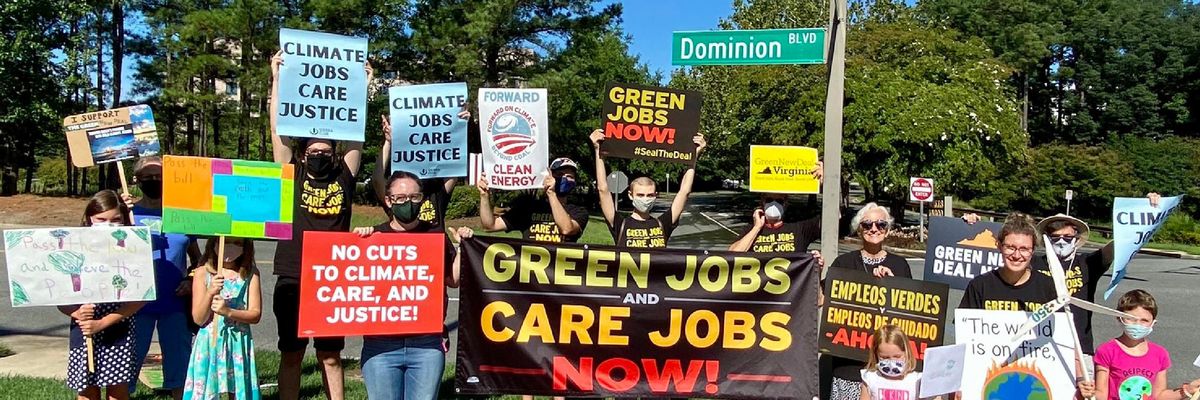With both chambers of Congress in recess following a pair of key U.S. Senate votes on infrastructure legislation, activists with the Green New Deal Network coalition on Thursday hosted a "Seal the Deal" national day of action pressuring Democrats to keep fighting for a bold $3.5 trillion package.
"Members of Congress must listen to their constituents and pass an infrastructure and jobs plan that prioritizes climate justice investments, expanding the care economy, and good jobs for all."
--Adrien Salazar, Grassroots Global Justice Alliance
"Communities of color and young voters turned out in record numbers during the last election to elect leaders in office who will respond to the needs of the communities they represent," said Adrien Salazar, policy director at Grassroots Global Justice Alliance, a coalition member of the Green New Deal Network, in a statement ahead of the events.
"People of color and low-wealth communities particularly are suffering the worst in the face of multiple overlapping crises," he continued. "During this recess our communities are letting our elected representatives know that the time for a historic, just, and equitable recovery is now."
The more than 70 actions across over 30 states come as hospital systems throughout the United States are struggling to care for Covid-19 patients in the midst of a surge driven by the highly contagious Delta variant and low vaccination rates, and as wildfires exacerbated by human-caused climate change continue to devour swaths of the U.S. West.
"Members of Congress must listen to their constituents and pass an infrastructure and jobs plan that prioritizes climate justice investments, expanding the care economy, and good jobs for all," said Salazar.
Before leaving Washington, D.C. earlier this month, senators approved both a less ambitious bipartisan infrastructure bill and a budget resolution for the $3.5 trillion proposal--the latter of which the U.S. House of Representatives is set to consider when it returns next week.
Noting that the Senate has kicked off the budget resolution process, which allows Democrats to advance the broader package without any Republican support, the coalition behind Thursday's demonstrations says that "now is the time to tell our members of Congress that 1) we want to see them fight to invest every dollar in the people--no cuts! and 2) we need them to protect investments in climate solutions, care, jobs, and justice."
The coalition's specific demands include a fully funded Civilian Climate Corps; $400 billion for clean energy; green, affordable public housing; coastal resilience and wildlife prevention; a pathway to citizenship for undocumented immigrants; spending on Native American infrastructure; expanding Medicare to cover dental, hearing, and vision care; tuition-free community college; paid family and medicare leave; and investments in child care.
Ahead of the day of action, the coalition highlighted how the bipartisan bill falls short on lead pipe removal, replacing diesel school buses, electrifying and expanding public transit, and improving electric vehicle (EV) charging infrastructure--emphasizing that passing the reconciliation bill alongside it is "necessary to combat significant environmental injustices."
Thursday's demonstrations targeted some GOP lawmakers--including Sens. Shelley Moore Capito (W.Va.) and Thom Tillis (N.C.) as well as Reps. Jeff Van Drew (N.J.) and Rob Portman (Ohio)--for their failures to "act on the climate crisis, unemployment, and Covid-19 recovery."
Some rallies were hosted to "support lawmakers who have been fighting for action on climate, transportation, care, and other critical issues to tackle the crisis our communities face," including Sens. Dick Durbin (D-Ill.) and Sherrod Brown (D-Ohio), while other events pressured House members to support the $3.5 trillion budget blueprint when they return to D.C.
The actions came after House Speaker Nancy Pelosi (D-Calif.) signaled Tuesday "that she won't be backed into a corner next week by moderates in her caucus who are refusing to back a budget agreement unless the speaker first allows a vote on the bipartisan infrastructure bill."
That's according to CNN, which reports:
Behind the scenes, the speaker is digging in. In a private caucus call Tuesday with the Democratic caucus in the House, leadership stood by their plan for next week telling the caucus that they still would force a vote on the budget, but not a vote on the underlying Senate-passed infrastructure bill as a handful of moderates wanted. It's further a sign that Pelosi is daring moderates to vote against her and face the wrath of their fellow members and outside groups.
[...]
Despite House Democratic leadership's comments earlier Tuesday, a group of nine moderate Democrats are showing no signs of backing away from their commitment not to vote for the budget resolution without an up or down vote on the [bipartisan] infrastructure bill itself.
As Common Dreams reported, Rep. Pramila Jayapal (D-Wash.), chair of the Congressional Progressive Caucus, took aim at those so-called moderates on Sunday, saying that "we can't call people moderate Democrats if they vote against child care, paid leave, healthcare, and addressing climate change."
In addition to calling out Democratic colleagues who won't commit to the $3.5 trillion package, some lawmakers--including Sen. Ed Markey (D-Mass.) and Reps. Nydia Velazquez (D-N.Y.) and Scott Peters (D-Calif.)--backed the Green New Deal Network demonstrations.
Markey, in a video about the rallies and infrastructure legislation earlier this week, said that "we have a once-in-a-generation opportunity to tackle some of the most pressing challenges our communities face by investing in climate solutions, our care workers, jobs, and critical new measures to fight inequality."
Senators aren't scheduled to return to Washington until mid-September. Sen. Bernie Sanders (I-Vt.), who plays a key role in the reconciliation process as chair of the Senate Budget Committee, plans to travel to the Midwest this weekend to promote the $3.5 trillion spending plan.
Sanders, who is set to visit GOP districts in Indiana and Iowa, said Thursday that "while it will have no Republican support in Washington, Democrats, Independents, and working-class Republicans all over the country support our plan to finally invest in the long-neglected needs of working families."




